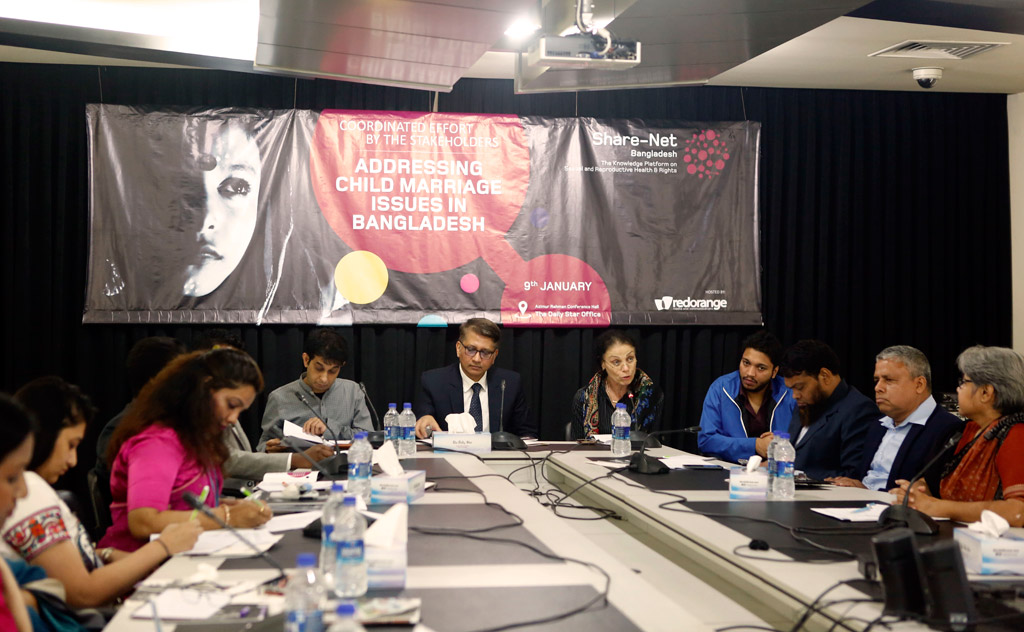Moving together to prevent Child Marriage
Share-Net Bangladesh organised a Roundtable Discussion titled ‘Coordinated efforts by different stakeholders addressing Child Marriage issues in Bangladesh’ as a part of its Collaborative Approach on January 9, 2019 at The Daily Star Center, Dhaka. Social and medical researchers, development practitioners, health workers, government officials and legal experts from various government and non-government organisations attended the event.
The aim of the meeting was to strengthen collaboration among stakeholders through ensuring coordinated effort to address Child Marriage in Bangladesh and to discuss current strategies that can effectively address the problem.
Arnob Chakrabarty, Managing Director, RedOrange Media and Communications chaired the meeting. He started the session by welcoming the guests and sharing the objectives of the meeting. Addressing the topic of the roundtable he said, “The expected outcome from the discussion is to find out what works, what does not work, learnings, experiences, existing gaps and specific areas to focus on what will help end child marriage in Bangladesh.”
He highlighted some of the key factors that drive Share-Net International and Share-Net Bangladesh. He also explained the Share-Net International Rapid Improvement Model to the guests.
Dr. Md. Sarwar Bari, Line Director of Field Services Delivery Unit and Dr. Annie Vestjens, First Secretary, SRHR and Gender, Embassy of the Kingdom of Netherlands joined the meeting as special guests.
Dr. Bari said, “Bangladesh is now experiencing a demographic transition. After decades of high growth rate, it is now finally decreasing but still the population will grow in the next few years. To reap benefits from the upcoming working population, emphasis on adolescents’ health and rights must be given.” He also said that stopping early pregnancy will also help reduce mother and child mortality rates, which is one of the consequences of child marriage.
Dr. Annie Vestjens stated that one of the main focuses of The Embassy of the Kingdom of the Netherlands is the betterment of the lives of women and girls by improving their sexual and reproductive health and rights. She said, “We believe that with the help of a collaborated effort, this knowledge (from the meeting) will be taken further to move forward in a coordinated way.”
Anika Binte Habib, coordinator, Share-Net Bangladesh, presented the aim of the Share-Net International Rapid Improvement Model. The Rapid Improvement Model uses collaborative approach with a focus on experimenting with strategies for moving newly acquired knowledge towards policy influencing and improving practice and spread this experience across the Share-Net Country Hubs- Netherlands, Bangladesh, Jordan and Burundi.
Some of the topics that were discussed at the roundtable were- the involvement of male family and community members in women’s empowerment, ensuring sanitation and hygiene in toilets across schools in rural areas, health consequences on elderly women as a result of childbearing at an early age. Several ways in which the programmes will be more sustainable, and the challenges that can be overcome through strategic communication were also discussed. Many recommendations were brought forward by the stakeholders at the meeting, one of which was to lead a master plan by the government and donors to prevent child marriages all over the country.
The meeting was successful in exchanging learnings and challenges faced by participating organisations who are implementing various programs and projects addressing child marriage in Bangladesh. The event ended with recommendations from participants that will benefit the peers to implement their projects more effectively.


